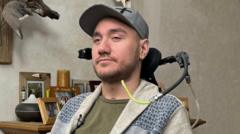In a breakthrough that seems to have stepped out of science fiction, Noland Arbaugh became the first individual to receive a brain-computer interface (BCI) from Neuralink, the neurotechnology company founded by Elon Musk. At just 30 years old, and eight years after a diving accident left him paralyzed from the shoulders down, Noland's participation in this experimental technology has opened new possibilities for independence and control over his life.
Noland's journey began with a dire prognosis post-accident that made him doubt whether he would ever have the capability to engage in work, studies, or hobbies again. Now, with the Neuralink chip implanted, he can control a computer using only his thoughts—a feat accomplished by detecting the minute electrical impulses in the brain associated with movement.
Although several firms are exploring similar brain interface technologies, Neuralink's association with Elon Musk has placed it under intense scrutiny as well as admiration. Noland remains focused on the science and what it means for people like him rather than the celebrity of its founder. "Good or bad, whatever may be, I would be helping," he expressed about participating in the trial.
This technology has already proven life-changing for Noland, with the capability to perform tasks that were once unimaginable for him. After the surgery, he was able to move a cursor on a screen simply by thinking about moving his fingers. Over time, his command of the device has advanced to playing chess and video games, restoring a beloved pastime to his life.
While many hail this innovation as a profound medical milestone, experts voice concerns regarding privacy and the ethical implications of accessing personal thoughts. Anil Seth, a professor of neuroscience, highlighted that the potential to decode thought patterns raises questions about personal autonomy and privacy.
Despite these concerns, Noland looks forward to expanding the chip’s capabilities to control his wheelchair and possibly a robotic arm in the future. However, his journey has not been without challenges. Technical glitches have caused temporary loss of function, emphasizing the need for further research and development in the field.
Other companies are entering the landscape as well, such as Synchron, with less invasive devices designed to assist individuals with similar impairments—offering avenues for various patient experiences. While they demonstrate potential, Noland's experience showcases a significant step in translating thoughts into actions.
Noland accepted to participate in the study for six years, after which the direction of his journey with Neuralink remains uncertain. Yet, he sees this venture as paving the way for a deeper understanding of the brain and the boundless possibilities ahead.
"The technology’s wonders are just beginning to unfold," he stated, capturing the essence of ongoing neurological exploration that may redefine human experience in the years to come.


















